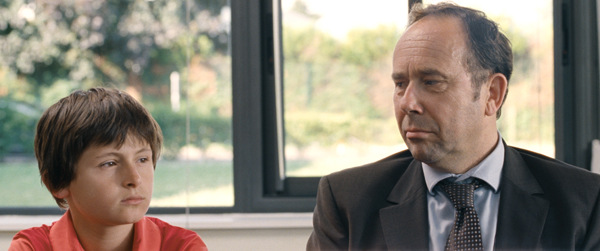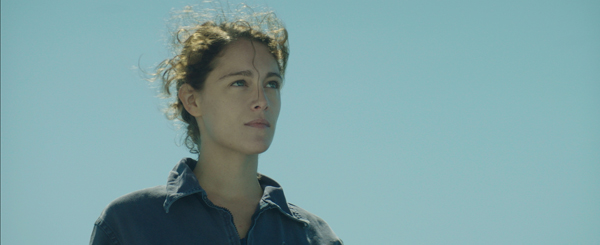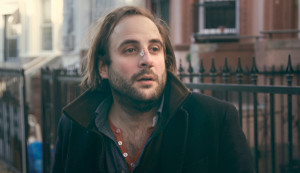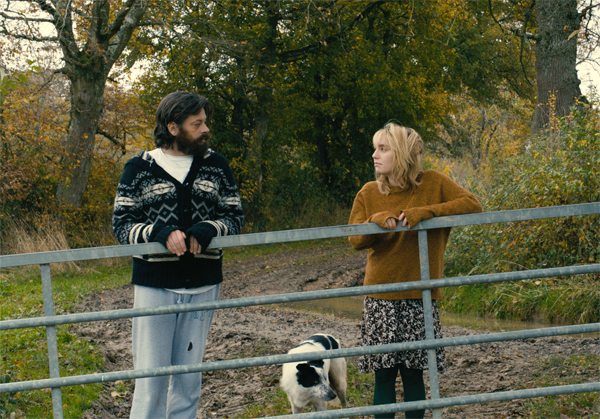
Charles Mérienne, left, and Olivier Gourmet in 40-Love (All photos: The Film Society of Film Society)
In one of the most diverse and compact film series that New York City has to offer, Rendez-Vous with French Cinema makes its annual late-winter trek to the Film Society of Lincoln Center, bringing with it films that have made the rounds in France’s awards season. (The top prize winner at the César Awards, Timbuktu, is already screening nationally.)
In addition, the series may offer one of the few opportunities in North America to catch a substantial slate of assured art-house films that aren’t yet scheduled for release, notably two explosive family dramas coproduced by arguably the most influential European filmmakers of the moment, brothers Jean-Pierre and Luc Dardenne.
Olivier Gourmet has been a mainstay in their films; he won the Best Actor Award at Cannes for 2002’s The Son. Since then, he has become the go-to everyman in French-language films. His layered and complex role in 40-Love ranks among his best and is one of this edition’s highlights.
The story line unfolds simply enough. Jérôme has lost his managerial job at a department store. In his late forties, he sees this setback as an opportunity to take charge of his destiny by opening his own shoe emporium. Driven by his myopic vision, Jérôme doesn’t pick up on his wife’s signals of discontent; she barely conceals her lack of support. (They look as though they’ve stepped out of a typical sitcom featuring a schlubby guy and his out-of-his-league wife.) Meanwhile, their 11-year-old son, Ugo (Charles Mérienne), is a wunderkind with an unusually slow heart rate that gives him more stamina on the tennis court than most kids and may make him a strong enough athlete to train in Paris.
However, both father and son hit a roadblock: despite his meticulous research, Jérôme has difficulty finding the collateral to open his business, and Ugo lacks the discipline to advance as an athlete. Director Stéphane Demoustier layers in a lot of story into 95 minutes. Every sequence, no matter how brief, packs in information and moves the story forward, furthering character development. Because the film is grounded in the everyday lives of this suburban middle-class family, the narrative effortlessly takes an unexpected turn as a result of a damaging, calculated, and self-centered choice.
Cédric Kahn, who made one of the best neo-noirs in the last decade, 2004’s Red Lights, teams up with the Dardennes for Wild Life. Based on a true story, it starts off with Nora (Céline Sallette), a young woman with dreads and Birkenstocks, packing up her few possessions and dragging her three unwilling sons out of a rusty trailer in the isolated countryside, and she takes them to the home of her very wealthy parents. Before Nora and her brood have a chance to settle in, she and the other adults in the household face an inevitable confrontation when her husband, Paco, comes banging at the front gate. He’s controlling, to say the least.
A year later, the acrimony between the couple has seemingly subsided, as Nora lets Paco into her apartment, allowing him his visitation rights for the next 24 hours. However, he never returns with two of her sons; he takes them deep into a patchwork of back-to-earth counterculture communes, where the three will go by various aliases. At first, the six- and seven-year-old boys are willing coconspirators with their father, dodging the police and blending into the backwoods in what the film suggests is a case of filial devotion meets Stockholm syndrome. A decade later, they grow into young adults, still nomads and self-proclaimed “children of the earth,” though the power dynamics between the brothers and father wavers.
Double-threat actor/director Mathieu Kassowitz’s performance as the tyrannical Paco is nothing short of terrifying. The more his teenage sons rebel, the more authoritarian—and unhinged—he becomes. Conspicuously, one part of the equation that’s missing after the first 10 minutes is the boy’s mother, who virtually disappears from the story, which makes the boys’ decision to run away from Nora puzzling. Roughly speaking, one characteristic of a Dardenne film is that the defining moment centers on a character making a life-changing decision. Here, however, that moment of clarity at the conclusion lacks emotional heft, considering that Nora and her eldest son have been largely left out of the picture.
Director Lucie Borleteau’s Fidelio, Alice’s (somewhat explicit) Odyssey, in which a 30-year-old woman’s sex life converges with her career, fits perfectly in the current landscape of American pop culture (think Girls and Fifty Shades of Grey). In other words, it’s the candid (as in a little raunchy) depiction of a woman’s sensuality from a female filmmaker’s point of view. Borleteau focuses on a headstrong, sexually confidant woman who has also fulfilled her career goal in the Merchant Navy. In her own manner, Alice (Ariane Labed) has it all, up to a point, navigating assertively and independently in an aggressively all-male environment.
The director deftly integrates sex scenes into the film’s hothouse atmosphere: a creaky, aging freighter turned lust bucket. It’s not for nothing that the film opens with Alice skinny-dipping in a secluded cove before walking onto the beach toward her handsome Norwegian boyfriend, where they have their own R-rated From Here to Eternity moment. It’s their last embrace for a while; Alice boards the Fidelio, already in transit to Africa, to replace an engineer who has died under murky circumstances. She’ll be living in close quarters with an international crew, including the captain (the ever-boyish Melvil Poupard), her former lover back when she was a cadet. The interactions among her and her colleagues have a casual touch, along with Lebed’s alert, quietly at-ease performance. The narrative flows easily, from one of Alice’s contradictions to the next.
Carnal sexuality is also at the forefront of Christophe Honoré’s cheeky variation of Ovid’s Metamorphoses, from the moment a hunter spies on a bather in the prologue. In this retelling of the Diana and Actaeon tale, the intruder will pay a price, turning into a stag not long for this world. Then chapter one, “Europa and Jupiter,” begins where a teenaged French Arab Europa ditches school for a ride with a pretty boy trucker, Jupiter. Just like in Handel’s day (the operas Semele and Alcina), sex takes center stage for both gods and mortals.
The collection of stories has a loosey-goosey, almost off-the-cuff feel, though it’s handsomely produced and shot in the suburban south of France: Pan, completely nude except for sneakers, roams in the woods, with the modern world never far away. Throughout, the likes of Mozart’s Zaide and (no surprise) Ravel’s Daphnis et Chloé serenade the audience on the soundtrack. Earthy and free of frills, Metamorphose has a touch of the bacchanalian influence of Pier Paolo Pasolini. This is a memorable way to brush up on your Greco/Roman myths.
Actor Vincent Macaigne has already cornered the market playing a ne’er do well man-child. He played a sad sack pining away for a beautiful younger woman in two films from last year’s series. The title of his new film bluntly announces his character’s nature: Stubborn, awkwardly translated from Une Histoire Américaine, and directed by Armel Hostiou.
The actor, who cowrote the script, plays a character named Vincent who has flown from France to surprise his ex, Barbara, an American now living in Brooklyn. She has a new boyfriend, a doctor, no less, and though she gently tells Vincent that they won’t get back together, her actions couldn’t be clearer: she buys him a one-way ticket back to Paris. Observing Vincent, who persists and refuses to take no for an answer, is like watching a train wreck: nothing stops him in his quixotic quest. Although he’s not violent, he hardly puts the audience at ease, and many viewers will find his entitlement exasperating. Along with Paco from Wild Life, Vincent is a new kind of movie bogeyman.
For the Rendez-Vous audience in New York, the film will represent armchair traveling in reverse: seeing the Big Apple through the eyes of an outsider. Scenes filmed under wintry skies, fog shrouds the skyline of Manhattan, while Brooklyn becomes an adult playground for an all-night bender in the corner dives that have held out against gentrification.
Last year at the Cannes Film Festival, the rambling, though good-natured romcom Love at First Fight startlingly snapped up the top three prizes in the Directors Fortnight section. In contrast, Whiplash came away empty-handed. Even more perplexing, its lead actress, Adèle Haenel, won the best actress César for this movie. Though she’s very strong and has become one of the best actors of her generation, her role is skimpy compared to other nominated performances, such as Juliette Binoche in Clouds of Sils Maria and Marion Cotillard in Two Days, One Night.
Love, which also screens here, has competition when it comes to quirky reluctant love: the scrappy shaggy dog two-hander Gaby Baby Doll. The title suits the infantile, needy Gaby (Lolita Chammah), a disheveled blond who ventures out to the countryside to get some rest, per doctor’s orders. Her guests have gone, and her boyfriend has stormed out, leaving her alone for the first time in her life. So the invasive nonstop talker latches on to the men of the dreary village before she barges into the shack of the curt hermetic caretaker of the nearby chateau. He wants to be alone, and strides way ahead of her as she lags behind him in his walks through the muddy countryside. Director Sophie Letourneur challenges the audience with two leads who resist an open embrace, but moment by moment, these polar opposites meet, ahem, in the middle. Like Gaby, the movie persists, wearing down resistance.
So uncompromising is the main figure of the raw Eat Your Bones, and repellant, too, that the festival, alas, may be one of the few venues screening this forlorn coming-of-ager. First off, the audience needs to become acclimated to the subtitles, which are translated into broken Cockney to resemble the speech: “drin” means drink, while “what” becomes “hat.”
In the first half of the film’s long setup, Jason, 18 and purposely a blank slate, lives among his family of travelers in trailers off a highway in Brittany—reviewers have referred to them as “gypsies” and uncharitably as “white trash.” Most of the clannish community has eschewed a life of crime and become Born Again—and this is the only French language film that I recall with contemporary evangelical services.
The film really centers on Jason’s half-brother Fred (Fred Doker), who returns home from a 15-year prison stint for killing a cop during a botched robbery. He immediately takes over, strutting around shirtless, flaunting his protruding beer belly and his half-finished tattoos; telling the Christians that they’re idiots; and proclaiming himself his family’s protector. On his first night of freedom, Fred returns to what he knows. Jason’s choice is clear cut: become baptized the next day or aid his brother in stealing a truckload of copper.
In a festival with its share of alarmingly single-minded males, Fred is the scariest; the audience is never sure what he’s thinking. When he speaks (declaims, really) to his brothers, his focus is elsewhere. He’s dead behind his blue eyes, and Doker gives a bulldozer of a performance. (Most of the nonprofessional cast are members of the same family.)
The first half is filmed by a roving, handheld camera, as if the preening and overreactive Fred doesn’t set off enough jitters. Drawn out and mundane, Eat feels almost anthropological. The taut conclusion, though, shot from both Fred’s and Jason’s perspectives, turns the film into a rough-and-tumble thriller without losing its credibility. Director Jean-Charles Hue won the Prix Jean Vigo award, for which there is no American equivalent, given to a director for spirit of independence and originality.
It’s rare when a film with Catherine Deneuve doesn’t make the cut in the program. In fact, she’s in three films: 3 Hearts, In the Courtyard, and In the Name of My Daughter. Jean Dujardin has been busy since winning an Academy Award for The Artist, though not all of his films have made it stateside. (The mediocre Monument Men barely counts; Dujardin was killed off midway.) He now stars as a Marseilles crime buster in The Connection, which has its U.S. premiere and will be out in theaters in late spring. As the title implies, it’s an alternative point of view of The French Connection. (Not to be more confusing, but its original title is Le French.)
So don’t despair if you’re not in New York this month. The following Rendez-Vous films will also be available soon in multiple platforms in the United States: Breathe with two stars in the making, Joséphine Japy and Lou de Laâge; Fidelio, Alice’s Odyssey; Hippocrates; May Allah Bless France!; Party Girl; and Reality.



















Leave A Comment